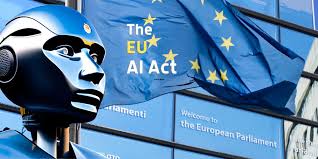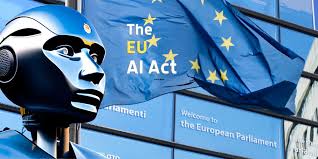
As negotiations entered their second day, EU lawmakers and governments reached a provisional agreement on Thursday that would control artificial intelligence (AI) systems such as ChatGPT. This move brought them one step closer to finalising historic regulations governing the technology.
One of the main obstacles to a final agreement was overcome as negotiations neared the 24-hour mark and all sides came to a provisional agreement in the early hours of Thursday on how to regulate rapidly expanding generative AI systems like ChatGPT, a source familiar with the matter told the media.
A document seen by Reuters that was distributed to legislators states that the European Commission will keep track of AI models that are considered to be a "systemic risk" and that companies that develop general-purpose AIs would need to release thorough summaries of the training material.
In most circumstances, the law may also protect open-source and free AI licences from regulation, unless they are used for explicitly prohibited or high-risk purposes, for example.
Two other sources familiar with the situation stated that terms for the other barrier, the application of AI in biometric surveillance, and source code access had not yet been worked out. Due to the confidentiality of the discussions, the sources chose not to be named.
The European Union Council had earlier on Thursday postponed a morning press conference till further notice in order to continue deliberations. At 1400 GMT on Wednesday, the EU governments and legislators began their discussion.
One of the individuals claimed that about 0200 GMT, amid heated discussions and annoyance over a malfunctioning drink machine, delegates ran out of food and coffee.
EU industry head Thierry Breton referred to the process of negotiations between Parliament, the Commission, and the Council as "New day, same trilogue!" in a post on social networking site X.
In a picture attached to the post, EU lawmakers Dragos Tudorache and Brando Benefei—who both serve as Parliament's key AI negotiators—are seen cuddling up to have a heated conversation with colleague legislator Kim van Sparrentak, who has also collaborated closely on the AI draught regulations.
While trying to finalise the details of the draught regulations put forth by the Commission two years ago, EU nations and legislators have found it difficult to keep up with the quickly advancing technological landscape. That made reaching an agreement challenging.
The new law has a lot riding on it for the bloc.
It might serve as a model for other governments drafting regulations for their own AI sectors, offering an alternative to China's temporary regulations and the U.S.'s lax approach.
In order to avoid parliamentary elections in June, which will halt the legislative process, EU nations and legislators are working quickly to finalise a deal for a vote in the spring.
If this isn't done, the bill may be postponed and the 27-member bloc's first-mover advantage over technology regulation may be lost.
Nevertheless, it might take almost two years for any legislation to be implemented.
The first comprehensive legal framework was put forth in the beginning of 2021, nearly two years before Microsoft-backed OpenAI's ChatGPT changed the potential applications of the technology.
Computer experts including Sam Altman, the founder of OpenAI, have also sounded the alarm about the risk of building extremely intelligent, potent computers that could endanger humankind.
It would be a significant step to agree on provisional terms for foundation models, or generative AI like OpenAI that trains on massive data sets to accomplish a variety of jobs.
What was agreed upon was not really clear. There were still issues to be worked out, according to a fourth source.
However, a point of contention was introduced by a late proposal by France, Germany, and Italy that manufacturers of generative AI models should self-regulate. But Mistral, an AI startup based in France, and Aleph Alpha, a German startup, would both profit from such a move.
Legislators in the EU want to outlaw the use of AI in biometric monitoring, but governments have fought for an exemption for military, defence, and national security needs.
(Source:www.theprint.in)
One of the main obstacles to a final agreement was overcome as negotiations neared the 24-hour mark and all sides came to a provisional agreement in the early hours of Thursday on how to regulate rapidly expanding generative AI systems like ChatGPT, a source familiar with the matter told the media.
A document seen by Reuters that was distributed to legislators states that the European Commission will keep track of AI models that are considered to be a "systemic risk" and that companies that develop general-purpose AIs would need to release thorough summaries of the training material.
In most circumstances, the law may also protect open-source and free AI licences from regulation, unless they are used for explicitly prohibited or high-risk purposes, for example.
Two other sources familiar with the situation stated that terms for the other barrier, the application of AI in biometric surveillance, and source code access had not yet been worked out. Due to the confidentiality of the discussions, the sources chose not to be named.
The European Union Council had earlier on Thursday postponed a morning press conference till further notice in order to continue deliberations. At 1400 GMT on Wednesday, the EU governments and legislators began their discussion.
One of the individuals claimed that about 0200 GMT, amid heated discussions and annoyance over a malfunctioning drink machine, delegates ran out of food and coffee.
EU industry head Thierry Breton referred to the process of negotiations between Parliament, the Commission, and the Council as "New day, same trilogue!" in a post on social networking site X.
In a picture attached to the post, EU lawmakers Dragos Tudorache and Brando Benefei—who both serve as Parliament's key AI negotiators—are seen cuddling up to have a heated conversation with colleague legislator Kim van Sparrentak, who has also collaborated closely on the AI draught regulations.
While trying to finalise the details of the draught regulations put forth by the Commission two years ago, EU nations and legislators have found it difficult to keep up with the quickly advancing technological landscape. That made reaching an agreement challenging.
The new law has a lot riding on it for the bloc.
It might serve as a model for other governments drafting regulations for their own AI sectors, offering an alternative to China's temporary regulations and the U.S.'s lax approach.
In order to avoid parliamentary elections in June, which will halt the legislative process, EU nations and legislators are working quickly to finalise a deal for a vote in the spring.
If this isn't done, the bill may be postponed and the 27-member bloc's first-mover advantage over technology regulation may be lost.
Nevertheless, it might take almost two years for any legislation to be implemented.
The first comprehensive legal framework was put forth in the beginning of 2021, nearly two years before Microsoft-backed OpenAI's ChatGPT changed the potential applications of the technology.
Computer experts including Sam Altman, the founder of OpenAI, have also sounded the alarm about the risk of building extremely intelligent, potent computers that could endanger humankind.
It would be a significant step to agree on provisional terms for foundation models, or generative AI like OpenAI that trains on massive data sets to accomplish a variety of jobs.
What was agreed upon was not really clear. There were still issues to be worked out, according to a fourth source.
However, a point of contention was introduced by a late proposal by France, Germany, and Italy that manufacturers of generative AI models should self-regulate. But Mistral, an AI startup based in France, and Aleph Alpha, a German startup, would both profit from such a move.
Legislators in the EU want to outlaw the use of AI in biometric monitoring, but governments have fought for an exemption for military, defence, and national security needs.
(Source:www.theprint.in)














